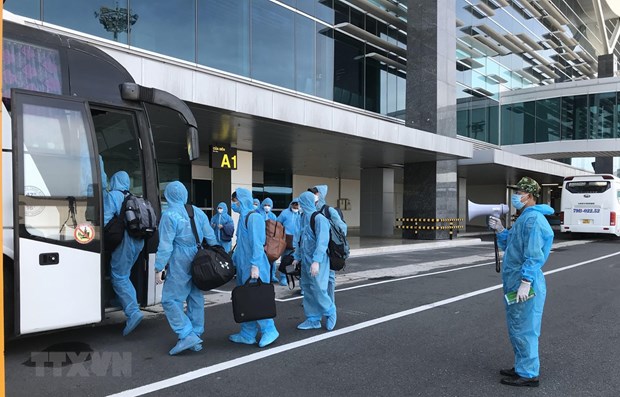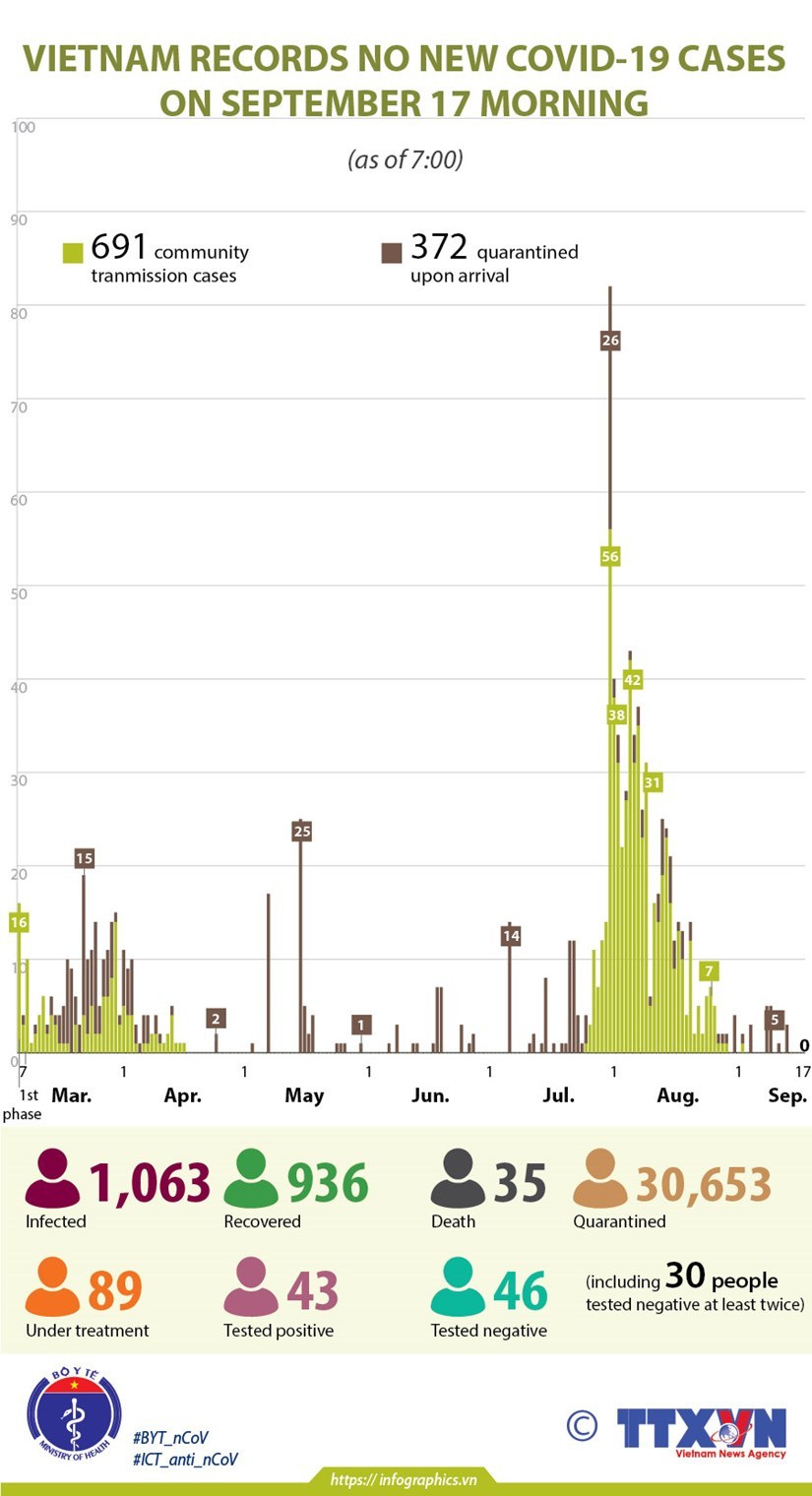Vietnam has gone through 15 straight days without any coronavirus infections in the community, according to the National Steering Committee for COVID-19 Prevention and Control.
 |
|
Vietnamese citizens from abroad go to quarantine sites after entry into the country (Photo: VNA) |
Vietnam has gone through 15 straight days without any coronavirus infections in the community, according to the National Steering Committee for COVID-19 Prevention and Control.
The country has confirmed 1,063 SARS-CoV-2 infections as of September 17 morning. Of the total, 691 were infected with the virus domestically, including 551 linked with central Da Nang city since the latest coronavirus wave broke out there on July 25.
As many as 936 patients have recovered while 35 died from complications related to the disease. Most of the fatalities were the elderly with serious underlying health conditions.
Among patients still under treatment, 16 have tested negative for SARS-CoV-2 once, 12 others twice and 18 thrice. Currently, three patients are in critical conditions.
There are 32,417 people who had close contact with confirmed cases or came from pandemic-hit regions under quarantine at present, including 471 in hospitals, 15,591 in other quarantine sites and 16,355 at home or accommodation facilities.
As the COVID-19 pandemic can return at any time, the Ministry of Health recommended people wear face masks in crowded places, and wash hands with soap or hand sanitiser regularly.
If anyone shows symptoms of fever, cough or shortness of breath, they should contact the Health Ministry’s hotline 19009095 for consultation and support.
Nearly 280 Vietnamese citizens brought home safely from Europe
Close to 280 Vietnamese citizens were repatriated home safe and sound from Europe on a flight conducted by national flag carrier Vietnam Airlines on September 16-17, in coordination with Vietnamese representative agencies based in Europe and authorities in host nations.
The passengers on board came from 10 nations, including children aged under 18, the elderly, pregnant women, workers whose visas or labour contracts expired, students with no residences due to dormitory closures and those in especially difficult circumstances
Amid the complicated developments of the novel coronavirus (COVID-19), Vietnamese representative agencies in Europe dispatched staff to Frankfurt Airport in Germany assist the citizens with necessary procedures before they boarded the flight.
Vietnam Airlines has strictly carried out security and pandemic preventive measures during the flight to prevent the spread of the novel virus.
Right after touching down at Noi Bai International Airport in Hanoi, all the flight crew and passengers were given heath checkups and placed into compulsory quarantine in accordance with regulations regarding COVID-19 prevention and control.
More repatriations flights are set to be conducted in the time ahead to bring home Vietnamese citizens with disadvantaged circumstances based on their need and the local quarantine capacity.
Quang Nam’s tourism sector adapts to “new normal” post-COVID-19
The central province of Quang Nam has introduced three scenarios regarding local tourism this year and in the years to come. Its tourism sector has been making every effort to adapt to the “new normal” following COVID-19.
After Hoi An city and districts throughout Quang Nam province relaxed social distancing measures and entered the “new normal”, local tour companies and travel agencies have joined hands to welcome tourists back to the province.
The My Son Cultural Heritage Preservation Management Board has improved service quality to better serve tourists in the post-pandemic period.
The province has provided the conditions necessary for local tourism companies to get back to business.
HCM City prepares 27 hotels as paid quarantine facilities
Twenty-seven hotels will be used as paid quarantine facilities for people required to be quarantined after arriving in Ho Chi Minh City, along with other existing quarantine facilities, according to the municipal Department of Health.
Nguyen Tan Binh, head of the department, said that Vietnam would resume flights to China, Japan, the Republic of Korea, Taiwan (China), Cambodia and Laos, among others.
Nearly 20,000 people will be expected to enter Vietnam this month, he said.
The department is cooperating with the Department of Tourism to use the 27 hotels for these people. The hotels expect to admit quarantined people and will be assessed to ensure safe criteria in COVID-19 prevention and control by the city's Center for Diseases Control (CDC) and district health centers.
A woman's temperature is checked before she enters quarantine at Phuong Nam Resort in Can Gio District in HCM City.
The hotels will charge fees based on their room vacancies. Quarantined people can choose rooms with suitable fees.
The city is waiting for guidance from the Ministry of Finance on fees for its quarantine areas and those managed by the military.
Vice Chairman of the municipal People’s Committee Le Thanh Liem has instructed the Department of Health and Department of Tourism to check the paid quarantine process at hotels. They should use more hotels if necessary, he said.
Binh said that the city’s quarantine areas and 27 hotels could admit about 3,000 people. On September 12, the CDC said that the two latest COVID-19 patients in the city have been discharged from hospitals. The city has had 77 COVID-19 patients since the beginning of the pandemic. All of them have recovered.
The city currently has 875 people in its quarantine areas and 246 quarantined at home.
Indonesia, Philippines record more COVID-19 cases
Indonesia on September 16 reported 3,963 new COVID-19 cases, the biggest daily rise so far, raising the total to 228,993.
The country also confirmed 135 deaths on the same day, bringing the total to 9,100.
Meanwhile, the Philippines recorded 3,550 new COVID-19 cases and 69 deaths over the past 24 hours, bring the country’s total number of infections and fatalities to 207,858 and 4,734, respectively.
Metro Manila topped with the highest number of daily confirmed cases reported on September 16 at 1,459.
Health Undersecretary Maria Rosario Vergeire said it is still early to say if there is a downward trend of cases because of the variability across different numbers reported per day.
Competent forces are trying to analyse the recent cases, she added.
Thailand seals border with Myanmar to stem COVID-19, drug trafficking
Thai Deputy Prime Minister Prawit Wongsuwan said on September 16 that the border checkpoints between Thailand and Myanmar are temporarily sealed in an attempt to curb possible COVID-19 infections and drug trafficking.
Prawit said that as the region is experiencing economic woes triggered by the pandemic, many were tempted to make big bucks by trafficking drugs into Thailand, then destined to a third country.
Thai authorities seized 28 million speed pills and 428 kg of crystal meth last month. Narcotics were smuggled from neighboring countries through northern and western provinces to Thailand’s central region.
According to Thai Defence Ministry spokesman Kongcheep Tantrawanit, from January 1 to August 31, officials arrested 179,050 drug suspects and seized 143 million methamphetamine pills and 5.4 tons of crystal meth.
With regards to sealing the border between Thailand and Myanmar, Prawit said traders can still transport their goods and placed them at the collection point at the border, without the need for physical contact.
Thailand, US cooperate in HIV, COVID-19 vaccine development
Thai Deputy Prime Minister and Public Health Minister Anutin Charnvirakul and US Ambassador to Thailand Michael George DeSombre have agreed to strengthen cooperation between the two nations in COVID-19 vaccine development in Thailand.
The minister says the Thai government is ready to support vaccine development by any institution, so that local people will have access to vaccines once they are developed.
Anutin and DeSombre observed vaccine research and development at the Armed Forces Research Institute of Medical Sciences (AFRIMS), and followed up on progress of the HIV and COVID-19 vaccine development programmes, jointly conducted by Thailand and the US.
The Thai official said the visit underlined the cooperation between the two countries in developing vaccines against dengue fever, malaria, acquired immune deficiency syndrome (AIDS), human immunodeficiency virus (HIV) as well as COVID-19.
The two nations also agreed to build a laboratory animal centre to test experimental vaccines. If the AFRIMS need assistance or support, the Ministry of Public Health has allocated funds for COVID-19 vaccine research. The ministry is ready to provide support for the benefit of mankind.
Anutin said the Ministry of Public Health doesn’t focus on any particular institution with regards to vaccine development. The ministry has signed agreements with many institutions in this country and abroad. COVID-19 vaccine development is still underway.
Concerning reports that one institution had to halt its vaccine development project, he said the institution has now resumed the project. Obstacles are considered normal in vaccine development, and the Thai government is ready to support any type of vaccine development. If a COVID-19 vaccine is discovered in a programme operating with the Thai government’s support, it will be provided to the Thai people first./.
Thai Cabinet approves long-stay visitor proposal starting next month
The Thai Cabinet has approved a Special Tourist Visa proposal to allow long-stay visitors to enter the country, subject to quarantine and other requirements, allowing eligible visitors to stay in the country for a maximum of 270 days.
Deputy Government Spokesperson Traisuree Taisaranakul has revealed that the Cabinet in its weekly meeting on September 16 approved the proposal for a country reopening to long-term visitors though the Special Tourist Visa (STV) arrangement, as proposed by the Ministry of Tourism and Sports.
With this visa, visitors entering the country must give their consent to complying with the public health regulations and requirements imposed by the Thai authorities, including a 14-day quarantine on arrival at their place of accommodation.
Visitors applying for this visa must be able to produce evidence of their long-term stay in Thailand, such as a receipt for their quarantine accommodation or hospital stay payment, plus either the payment confirmation for accommodation or hospital stay after their quarantine, or a copy of the title deed of their condominium, owned by either the applicant or a family member, or confirmation of a rental condominium or house, or a down payment confirmation for the purchase or rent of a unit legally sold to a foreigner.
After completing the COVID-19 screening and quarantine measures set out by the Ministry of Public Health and other agencies, and provided that all the accommodation requirements are met, foreigners can apply for the Special Tourist Visa with the fee of 2,000 THB.
The visa will come with a 90-day validity. An extension for another 90 days can be applied for twice, subject to the discretion of an immigration officer, with new applications and fee to be resubmitted and paid each time.
This Special Tourist Visa arrangement will be effective once publicly announced, until September 30, 2021.
The deputy government spokesperson said this arrangement has been made to attract high-spending tourists to the country in order to help with the recovery of tourism and related businesses.
Before the COVID-19 pandemic, Thailand usually earned no less than 2 trillion THB each year from international tourists. The lack of foreign visitors has deprived the tourism sector of revenue, causing a knock-on effect to all sectors in the economy.
The Thai government is now seeking to allow international visitors to return to limited areas of the country in order to ensure effective disease control against another spike of COVID-19 cases.
 |
|
|